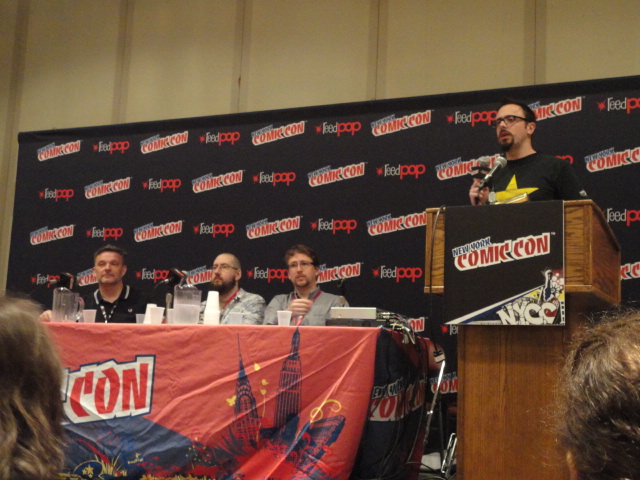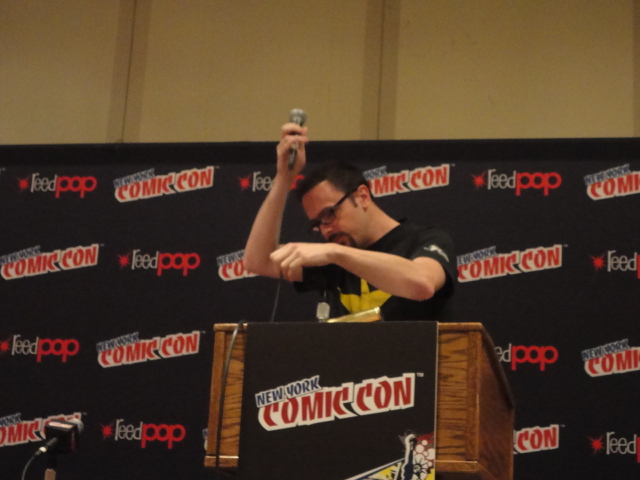Starting with moderator Mike Molcher quickly breaking two microphones in a row and ending with him soliciting selected members of the audience for sexual favours, the 2000AD Panel lived up to the reputation carefully cultivated by the company. He was joined onstage by Ian Edginton, Al Ewing, and Andy Diggle to talk about all the current stories running through the weekly comic magazine, and also to talk extensively about Ewing’s favourite arse. If you click to read this, you know what you’re getting in to.
After hopefully fixing both microphones, the panel started with Molcher asking Diggle, a former editor for 2000AD as well as writer, what set the publication apart from American comics. The question was asked with the caveat that at any point Molcher might yell out “WHO WANTS A FREE COMIC?”, at which point the first person in the audience would get a trade paperback of 2000AD storylines.
Unperturbed, Diggle said that he felt 2000AD’s success was the way in which it had become a proving ground for creators. Due to the brevity of the stories – 2000AD tells serialised stories which are usually around 5-8 pages long at a time – the stories had to become denser. Creators have less pages to work with, meaning that if they manage to crack the art of writing a short story, they’ve essentially cracked the art of comics as a whole. It’s far harder to move the other way, going from 20-page comics down to 5-page stories.
He continued that he felt there was a dominant voice to 2000AD as a series, and played up aspects like the black humour in the stories and the subversive nature of the storytelling as a whole. Ewing added that 2000AD always asked to pitch with your own voice. When working with Henry Flint on their series Zombo, Flint came up with the idea himself and then brought it to Ewing. Ewing’s other series Dalmation Station was created as a response to editorial’s request that he write something with a “future war”. As long as there was a war in it somewhere, he could do anything else with the story he wanted.
Speaking to this, Molcher noted that 2000AD are the only comics company who have a nailed-down policy for writing submissions. The company ask prospective writers to create a four-page “Future Shocks” standalone storyline. The idea is that it has a twist on the final page which subverts the rest of the comic. Four pages, one story – if you can make that work, then 2000AD are onboard with you as a writer.
This led into a talk about some of the more memorable rejections from the submissions pile which the panellists had encountered. Diggle remembered fondly when he found a short prose story called “Fishing with Grandpa” in the pile. This was a prose story, telling the tale of a time when somebody went fishing with their grandpa. There was no twist – just a lot of lovely fishing.
Molcher remembered getting a letter from somebody which said “I am a fluffer in gay Italian porn, and I believe this qualifies me”.
Interestingly, Ian Edginton was an example of a creator who first wrote stories in America and then moved to 2000AD later on, subverting the traditional course. He wrote books like The Terminator and for companies like Crossgen (he was not TOO keen on Crossgen, it turned out) and then submitted a story for the Judge Dredd Megazine, which stands alongside the 2000AD magazine. After Crossgen collapsed he was under severe financial strain, and he had to take the acceptance letter from Rebellion over to his bank manager, because otherwise they would have taken his house.
He’s recovered since then, with his series Brass Sun. He called this a “clockpunk” series, which he’s been building up piece by piece over the last year. Created with INJ Culbard, each story introduced a new part of a big clockwork galaxy into the narrative, with planets getting brought into the story one by one.
From here, the panel talked about a few of the currently-running series in 2000AD, with Molcher getting cheers from the crowd after mentioning ‘Trifecta’. Al Ewing, who had been involved in that storyline, said he was going to be bringing a number of his Judge Dredd subplots together and culminating several of them in the near future. He’ll be writing a story in the Megazine about the criminal element in Dredd’s home city, and what they get up to in the aftermath of a huge catastrophe.
Speaking of Dredd, Diggle spoke about the character at length. Dredd is a strange character to have in the lead OH WAIT I forgot to tell you about Mike Molcher’s constant interruptions to give away free comics. Here’s a picture of him breaking a microphone to make up for it.:
Anyway, Dredd. Diggle felt like Dredd was a surprising breakout character for 2000AD as a publication, because he represents the opposite of what the comic is typically about. He represents pure authority, and typically 2000AD is more anti-authority in nature. But the character – and the satire of his actions and series as a whole – create a sense of flexibility for writers. He can be placed into any kind of story; from horror to action to social politics to humour; and the character can work within the framework.
Every time Dredd is written to be more extreme, the panel found that readers reacted with delight. Which, really, created a conflict between the readership and the intent of the writers. Dredd is not intended to be a role model – he’s a fascist.
Edginton will be returning to Dredd soon himself, for a story which will feature a heavy supernatural/horror element to it. Drawn by Dave Taylor, the story will focus on a Judge who works as an exorcist, and the villains will be aliens who steal dead bodies, burn them, and then smoke the fumes to get high.
2000AD, everyone!
At this point Mike Molcher ran out of questions, so he asked the panellists and audience to all recommend their favourite recent stories:
Al Ewing recommended Kingdom, by Dan Abnett and Richard Elson, which started as an action comic but moved into something far bigger and more epic in scale.
Andy Diggle recommended Trifecta, trying hard not to spoil the premise of the storyline – which is a huge part of the immediate appeal in it. He also recommended Cradlegrave, by John Smith and Edmund Bagwell.
Ian Edginton’s recommendation was Ten Seconders, by Rob Williams and Mark Harrison/Dom Reardon. This is one of the few superhero stories that have been told by 2000AD – Edginton felt 2000AD typically tend to avoid the superhero genre, because “that’s what everybody else does”.
Mike Molcher recommended Zombo, by the aforementioned team of Henry Flint and Al Ewing. Edginton then also recommended Ordinary, the new creator-owned story by Rob Williams and D’Israeli.
* During the Q&A, the panellists were asked if 2000AD had ever been approached by animation studios – and apparently yes, they were once approached for ABC Warriors (and that pitch can be found here)
* They were asked about collaborations between writers and artists. Edginton spoke about working with D’Israeli, who contributes a number of ideas and premises for each story they work together on. By comparison, he found that when working with INJ Culbard he was best off writing fewer panels into the story, as Culbard has an expansive art style which works best in space.
Al Ewing said working with Henry Flint was a fairly easy task. Their most recent work on Zombo came about when Ewing said “I want to make fun of the Beatles”. He plots the story, then runs that past Flint, who sends back notes on it.
Andy Diggle recalled first finding Jock’s work in the submissions pile for 2000AD. From that, the pair have gone on to have a long creative partnership, on stories like Snapshot and The Losers.
* When asked about their influences outside of 2000AD and American comics, Ewing explained a comic he read as a child which was called ‘Oink’. A… fairly immature and crude series, his favourite ever joke concerns the final page of the only issue his parents ever allowed him to have. And it wasn’t really a joke, more a large arse which had been drawn at the end of the comic.
Bums aside, The Beano was also cited as a major influence, along with war comics like Valiant, Hotspur and Kelly’s Eye. Asterix was mentioned by Andy Diggle.
* The final question asked if there would ever be more Cradlegrave – the answer being “no”. 2000AD tend to allow a story to stay dead once it’s over, Molcher said, bringing up the recent finale of Nikolai Dante as an example. Dead tends to mean dead in 2000AD. Diggle spoke to this especially, saying that stories need to have a beginning, middle, and end. If they don’t have an end – like for companies like Marvel and DC, perhaps – then the stories aren’t complete.
With that, Molcher shouted the phrase to give away the last book. Unable to tell who responded first, he brought four members of the audience up onto the stage, solicited them all for sexual favours, and then asked them all to give a reason WHY they should get a free comic. Ultimately the book went to a female reader who said she had never read 2000AD before – so here was a panel which resulted in at least one new 2000AD reader.








